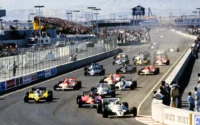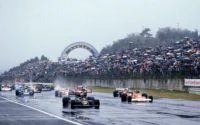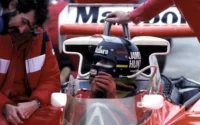Ensign was a British Formula One constructor that made a name for itself not with silverware, but with grit, persistence, and the occasional flash of brilliance. Across 133 Grand Prix, the team entered 155 cars, scored 19 championship points, but never reached the podium. Their single standout performance came at the 1981 Brazilian Grand Prix, when Marc Surer powered the car to a remarkable fourth place, snatching the fastest lap of the race for good measure.
The team was the brainchild of Morris Nunn, who not only founded Ensign but also doubled up as its designer during its formative years. Nunn’s influence stretched far beyond Ensign: he later crossed the Atlantic to the Champ Car series, where he engineered championship-winning machines for Alex Zanardi and Juan Pablo Montoya in the late 1990s.
Formula One Beginnings
The adventure began in 1973, with financial backing from pay driver Rikky von Opel. Fresh from winning the 1972 Lombard North Central British Formula Three Championship in an Ensign, von Opel commissioned the team’s first Formula One chassis. The debut season was rough: von Opel only finished two races, the best result being a 13th place at the British Grand Prix. He stayed for the start of 1974, but soon jumped ship for a Brabham works drive.
Ensign scrambled to fill the seat. Vern Schuppan stepped in, managing a 15th at the Belgian Grand Prix before handing over to Mike Wilds. Wilds at least reached the flag in the U.S. Grand Prix, though nine laps down and unclassified.
The First Points
In 1975, Dutch company HB Bewaking brought sponsorship, and with it Dutch drivers. Roelof Wunderink struggled, but Gijs van Lennep delivered Ensign’s very first points with a sixth place at the German Grand Prix. That same year Chris Amon joined briefly, showing promise but only managing 12th-place finishes in Austria and Italy.
Amon stayed in 1976 and was blisteringly quick in qualifying, third on the grid in Sweden, sixth in Britain, but his races rarely came together. A lone fifth place in Spain brought points before he was replaced by Patrick Nève, Hans Binder, and then Jacky Ickx.
Late ’70s: A Carousel of Drivers
Clay Regazzoni joined in 1977, picking up five points with fifth-place finishes in Italy and the U.S. The following year was chaotic: Danny Ongais and Lamberto Leoni both quit early, Jacky Ickx returned for four races, and Derek Daly eventually picked up a single point in Canada. Historic footnote: Nelson Piquet made his Formula One debut with Ensign at Hockenheim in 1978, before moving on to far greater things.
In 1979, Daly stayed on but left mid-season. His replacement Patrick Gaillard struggled to qualify, so Marc Surer was drafted in for the final races.
The 1980s: Highs, Lows, and Heartbreak
Regazzoni came back in 1980, but tragedy struck at Long Beach. A brake failure sent him into Ricardo Zunino’s stationary car at the Queen’s Hairpin, leaving him paralysed. Stand-in drivers Tiff Needell and Jan Lammers tried to carry the torch, but the results never came.
Marc Surer delivered Ensign’s best ever race in 1981, fourth in Brazil, plus the fastest lap. He added a sixth in Monaco before yielding the seat to Eliseo Salazar, who grabbed another point with sixth at the Dutch Grand Prix. In 1982, Roberto Guerrero took over, but reliability woes meant he only finished two races.
That same year, Ensign had a parallel triumph: with Jim Crawford behind the wheel, they won the final season of the British Formula One Championship, using the older MN180B chassis.
The Endgame
By the close of 1982, Ensign merged with the Theodore team, already a close ally thanks to financier Teddy Yip. Much like modern-day Red Bull and Toro Rosso, the two outfits often ran near-identical cars. Guerrero and Ensign’s lead designer continued with Theodore into 1983, but the operation folded before the season’s end.
Ensign never became a front-runner, but its story is woven with resilience, surprise performances, and a quiet influence on racing history. From giving Nelson Piquet his F1 debut to delivering Morris Nunn into Champ Car legend, Ensign’s legacy goes far beyond the results sheet.
Ensign Racing Formula One World Championship Records
| First entry | 1973 French Grand Prix |
|---|---|
| Races entered | 134 (98 starts) |
| Constructors’ Championships | 0 |
| Drivers’ Championships | 0 |
| Race victories | 0 |
| Pole positions | 0 |
| Fastest laps | 1 |
| Final entry | 1982 Caesars Palace Grand Prix |
Ensign Racing Constructors’ Championship Results
Team Names
| Years | Name |
|---|---|
| 1973–1974, 1976, 1979 | Team Ensign |
| 1975 | HB Bewaking Team Ensign |
| 1977 | Team Tissot Ensign with Castrol |
| 1978 | Team Tissot Ensign |
| 1980 | Unipart Racing Team |
| 1981–1982 | Ensign Racing |
Formula One Summary
| Year | Chassis | Engine | Tyre | No. | Drivers | Rounds | WCC Points | WCC Pos. | Report |
|---|---|---|---|---|---|---|---|---|---|
| 1973 | N173 | Ford Cosworth DFV V8 3.0 | F | Rikky von Opel | 8–10, 12–15 | 0 | NC | Report | |
| 1974 | N174 | Ford Cosworth DFV V8 3.0 | F | 22 | Rikky von Opel | 1 | 0 | NC | Report |
| Vern Schuppan | 5–11 | ||||||||
| Mike Wilds | 12–15 | ||||||||
| 1975 | N174 N175 | Ford Cosworth DFV V8 3.0 | G | 31 | Roelof Wunderink | 4–5, 10, 13–14 | 1 | 12th | Report |
| Gijs van Lennep | 8–9, 11 | ||||||||
| Chris Amon | 12 | ||||||||
| 32 | 13 | ||||||||
| 33 | Roelof Wunderink | 12 | |||||||
| 1976 | N174 N176 | Ford Cosworth DFV V8 3.0 | G | 22 | Chris Amon | 2–7, 9–10 | 2 | 12th | Report |
| Patrick Nève | 8 | ||||||||
| Hans Binder | 11 | ||||||||
| Jacky Ickx | 12–15 | ||||||||
| 1977 | N177 | Ford Cosworth DFV V8 3.0 | G | 22 | Clay Regazzoni | All | 10 | 10th | Report |
| Jacky Ickx | 6 | ||||||||
| 1978 | N177 | Ford Cosworth DFV V8 3.0 | G | 22 | Danny Ongais | 1–2 | 1 | 13th | Report |
| Lamberto Leoni | 4 | ||||||||
| Jacky Ickx | 5–8 | ||||||||
| Derek Daly | 9–10, 12–16 | ||||||||
| Nelson Piquet | 11 | ||||||||
| 23 | Lamberto Leoni | 1–3 | |||||||
| Brett Lunger | 15 | ||||||||
| 1979 | N177 N179 | Ford Cosworth DFV V8 3.0 | G | 22 | Derek Daly | 1–7 | 0 | NC | Report |
| Patrick Gaillard | 8–12 | ||||||||
| Marc Surer | 13–15 | ||||||||
| 1980 | N180 | Ford Cosworth DFV V8 3.0 | G | 14 | Clay Regazzoni | 1–4 | 0 | NC | Report |
| Tiff Needell | 5–6 | ||||||||
| Jan Lammers | 7–14 | ||||||||
| 41 | Geoff Lees | 11–12 | |||||||
| 1981 | N180B | Ford Cosworth DFV V8 3.0 | A M | 14 | Marc Surer | 1–6 | 5 | 11th | Report |
| Ricardo Londoño | 2 | ||||||||
| Eliseo Salazar | 7–15 | ||||||||
| 1982 | N180B N181 | Ford Cosworth DFV V8 3.0 | A P | 14 | Roberto Guerrero | 1–3, 5–16 | 0 | NC | Report |
Privateer Summary
| Year | Entreat | Chassis | Engine | Tyre | No. | Drivers | Rounds |
|---|---|---|---|---|---|---|---|
| 1977 | Theodore Racing Hong Kong | N177 | Ford Cosworth DFV V8 3.0 | G | 23 | Patrick Tambay | 10–17 |
| 1978 | Mario Deliotti Racing | N175 | Ford Cosworth DFV V8 3.0 | G | 23 | Geoff Lees | 10 |
| Sachs Racing | N177 | Harald Ertl | 11–14 |







